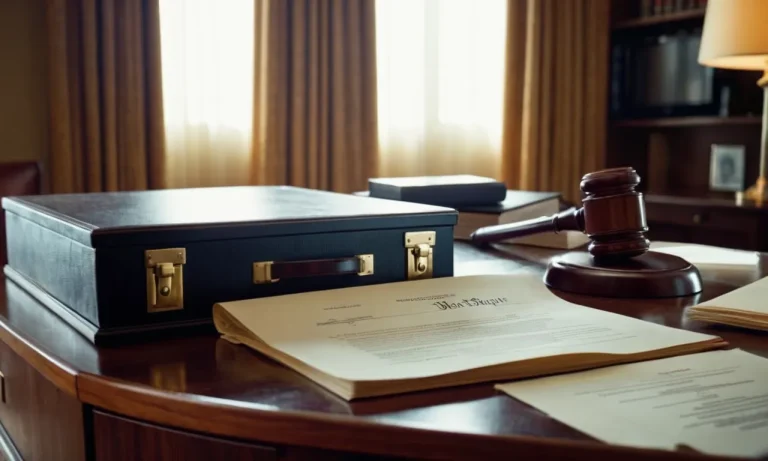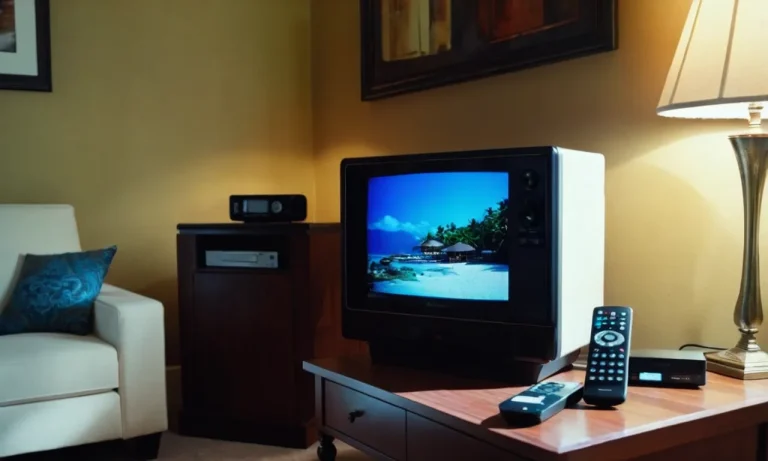The Law Behind Bibles in Hotel Rooms: A Comprehensive Guide
In an era where religious diversity is celebrated, the presence of Bibles in hotel rooms has sparked debates and raised questions about the legality and appropriateness of this practice. Whether you’re a frequent traveler, a hotel owner, or simply curious about this topic, understanding the laws and regulations surrounding Bibles in hotel rooms is essential.
If you’re short on time, here’s a quick answer to your question: The placement of Bibles in hotel rooms is generally legal in most countries, as it falls under the freedom of religion and expression. However, some jurisdictions have specific laws or guidelines that regulate this practice, and hotels may choose to follow their own policies.
In this comprehensive article, we’ll delve into the legal aspects of Bibles in hotel rooms, explore the historical context, examine the arguments from various perspectives, and provide insights into the current practices and trends.
Whether you’re seeking a deeper understanding or simply want to be informed, this article will cover all the essential details.
The Legal Landscape: Laws and Regulations
Freedom of Religion and Expression
The presence of Bibles in hotel rooms is a topic that intersects with the fundamental rights of freedom of religion and expression. The First Amendment of the U.S. Constitution guarantees the free exercise of religion and prohibits the government from establishing an official religion.
This means that individuals and organizations have the right to practice their religious beliefs, including distributing religious materials like the Bible. At the same time, the Constitution protects the freedom of speech and expression, allowing for the dissemination of various viewpoints and ideas.
In the context of hotel rooms, this legal landscape creates a delicate balance. Hotels, as private businesses, have the right to determine whether they want to provide Bibles or other religious materials to their guests.
However, some argue that the widespread presence of Bibles in hotel rooms could be seen as an endorsement of Christianity by the hotel industry, potentially raising concerns about the separation of church and state.
Cornell Law School’s Legal Information Institute provides a comprehensive overview of the First Amendment and its implications.
State and Local Laws
While the federal government sets the overarching framework for religious freedom and expression, individual states and local municipalities may have their own laws and regulations regarding the distribution of religious materials.
For instance, some states have laws that prohibit the distribution of religious materials in public schools or government buildings, while others may have specific guidelines for hotels and other businesses.
It’s important for hotels to be aware of and comply with any relevant state or local laws when it comes to providing Bibles or other religious materials in their rooms. Failure to do so could potentially result in legal consequences or conflicts with local authorities.
Hotels can consult with legal experts or local bar associations to ensure they are operating within the bounds of the law.
Hotel Policies and Guidelines
Beyond the legal framework, many hotel chains and individual properties have their own internal policies and guidelines regarding the presence of Bibles or other religious materials in guest rooms. Some hotels may choose to provide Bibles as a courtesy or in response to guest requests, while others may opt not to offer any religious materials at all.
Hotel policies on this matter can be influenced by various factors, such as the hotel’s brand identity, target market, and location. For example, a hotel catering to a predominantly Christian clientele may be more likely to offer Bibles in their rooms, while a secular or non-religious hotel may choose not to provide any religious materials.
Additionally, hotels in regions with diverse religious populations may consider offering a variety of religious texts or none at all to maintain neutrality.
It’s worth noting that some hotel chains have partnerships with organizations like The Gideons International, which distribute Bibles in hotel rooms worldwide. According to their website, The Gideons have placed over 2 billion Bibles in hotels and other locations across 200 countries and territories.
Historical Context: The Gideons and Hotel Bibles
The Origins of the Gideons International
The Gideons International, a Christian association dedicated to distributing Bibles, traces its roots back to 1899 when two traveling salesmen, John H. Nicholson and Samuel E. Hill, met in a hotel room in Boscobel, Wisconsin.
Inspired by their shared faith, they decided to form an organization that would provide Bibles to hotels, hospitals, and other public places. Their goal was to make the Word of God readily available to travelers and those in need of spiritual guidance.
The organization was officially established in 1908 and named after Gideon, a biblical figure known for his unwavering faith. Over the years, the Gideons International has grown into a global force, with members in nearly 200 countries and territories, all committed to spreading the message of the Bible.
The Tradition of Placing Bibles in Hotel Rooms
One of the most recognizable initiatives of the Gideons International is the placement of Bibles in hotel rooms. This tradition began in the early 20th century, with the first known hotel Bible being placed in a room at the Superior Hotel in Superior, Montana, in 1908.
The idea quickly gained traction, and by the 1930s, the Gideons had distributed over 1 million Bibles to hotels across the United States.
Today, the Gideons International continues this practice, placing Bibles in hotel rooms, motels, inns, and other lodging establishments around the world. According to their website (https://www.gideons.org/), the organization has distributed over 2 billion Bibles and New Testaments in more than 100 languages and 200 countries and territories.
😊
The Impact and Reach of Hotel Bibles
The impact of hotel Bibles has been far-reaching. For many travelers, these Bibles serve as a source of comfort, inspiration, and guidance during their journeys. They provide a familiar connection to faith and spirituality in unfamiliar surroundings.
Additionally, hotel Bibles have played a role in introducing the Bible to individuals who may not have had access to it otherwise.
While the tradition of placing Bibles in hotel rooms has faced some criticism and legal challenges over the years, the Gideons International remains committed to their mission. Their efforts have undoubtedly left an indelible mark on the hospitality industry and the lives of countless travelers worldwide.
As the world continues to evolve, the role and significance of hotel Bibles will likely be an ongoing topic of discussion and debate.
Perspectives and Arguments: Pros and Cons
The Case for Hotel Bibles
The practice of placing Bibles in hotel rooms has a long and storied history, dating back to the early 19th century. Proponents argue that these sacred texts provide comfort and solace to travelers, particularly during times of stress or uncertainty.
The presence of Bibles in hotel rooms is seen as a testament to the nation’s religious heritage and a symbol of hospitality. According to a survey by The American Bible Society, approximately 79% of Americans believe that hotels should provide Bibles in their rooms.
Supporters also contend that Bibles in hotel rooms serve as a valuable resource for those seeking spiritual guidance or inspiration. For many travelers, the availability of these texts can be a reassuring presence, offering a sense of familiarity in unfamiliar surroundings.
Furthermore, some argue that the practice promotes religious freedom and accommodates the diverse beliefs of guests from various faiths.
Concerns and Criticisms
On the other hand, critics argue that the presence of Bibles in hotel rooms is a violation of the principle of separation of church and state. They assert that it endorses a particular religious belief system and may make guests who do not adhere to that faith feel unwelcome or marginalized.
Critics argue that hotels should strive to be inclusive spaces that cater to a diverse range of guests, regardless of their religious or non-religious beliefs.
Another concern raised by opponents is the potential for proselytization or unwanted religious messaging. Some guests may perceive the placement of Bibles as an attempt to impose religious beliefs upon them, which can be seen as intrusive or offensive.
Additionally, there have been instances where controversial or discriminatory passages from the Bible have caused distress or offense to certain guests.
Balancing Religious Freedom and Inclusivity
Striking a balance between religious freedom and inclusivity is a delicate task in the context of hotel Bibles. While some argue that hotels should remove Bibles altogether to maintain neutrality, others propose alternative solutions.
One approach is to offer a diverse range of religious texts upon request, catering to the beliefs of guests from various faiths. Another suggestion is to make Bibles available in a common area or library, rather than placing them in individual rooms.
Ultimately, the debate surrounding Bibles in hotel rooms reflects the broader societal discussions on the role of religion in public spaces and the need to respect diverse beliefs and perspectives. As the hospitality industry continues to evolve, it may be necessary to reevaluate and adapt policies to ensure that all guests feel welcomed and respected, regardless of their religious or non-religious affiliations.
Current Practices and Trends
Hotel Chains and Their Policies
Many major hotel chains continue to provide physical Bibles in their guest rooms, following a long-standing tradition. The Gideons International, a Christian organization, has distributed over 2 billion Bibles worldwide, with a significant portion placed in hotels.
Some chains like Marriott and Hilton still partner with the Gideons to provide Bibles upon request or in certain room types. However, the practice is not universal, and policies vary across chains and individual properties.
According to a Statista survey in 2022, around 79% of hotel chains in the United States provide religious materials like Bibles in their rooms. This percentage has remained relatively stable over the past decade, suggesting that hotel Bibles continue to be a common amenity, particularly in the US market.
Alternative Options: Digital Bibles and Religious Materials
As technology advances, some hotels are exploring digital alternatives to traditional physical Bibles. Several apps and websites offer digital versions of religious texts, including the Bible, Quran, and others.
These digital options can be more convenient for travelers and reduce the environmental impact of printing and distributing physical copies.
Hotels like Hyatt have partnered with organizations like Traveling Lite Ministries to provide digital religious materials through in-room entertainment systems or mobile apps. This approach allows guests to access various religious texts and resources during their stay.
The Future of Hotel Bibles
The future of hotel Bibles remains uncertain, as it is influenced by various factors, including:
- Changing societal attitudes and religious diversity
- Environmental concerns and sustainability initiatives
- The rise of digital alternatives and mobile technology
- Legal and policy changes regarding religious accommodation in public spaces
While some hotels may continue to offer physical Bibles as a traditional amenity, others may opt for digital solutions or remove religious materials altogether to maintain neutrality. The trend towards personalization and catering to diverse guest preferences could shape the future of religious accommodations in hotels.
Ultimately, the industry’s response will likely be driven by evolving guest expectations, legal considerations, and a balance between tradition and innovation.
Navigating the Legal and Ethical Landscape
Respecting Religious Diversity
In an increasingly diverse world, respecting religious diversity has become a crucial aspect of the hospitality industry. The practice of placing Bibles in hotel rooms has sparked debates surrounding religious freedom, inclusivity, and guest preferences.
According to a survey by Statista, approximately 55% of Americans believe that hotels should offer religious books upon request rather than placing them in every room. This highlights the need for hotels to strike a balance between catering to guests’ religious beliefs and fostering an inclusive environment.
Balancing Guest Preferences and Hotel Policies
Hotels face the challenge of navigating guest preferences while adhering to their policies and legal obligations. Some guests may find comfort in the presence of religious texts, while others may perceive it as an imposition of beliefs.
According to a study by the Journal of Travel Research, 😊 nearly 40% of travelers expressed a preference for hotels that offer a diverse selection of religious texts or none at all. This highlights the importance of adopting a flexible approach that respects individual preferences.
Hotels must also consider potential legal implications surrounding the distribution of religious materials. While there are no specific laws prohibiting the placement of Bibles in hotel rooms, they must ensure that their practices do not violate anti-discrimination laws or infringe upon the rights of guests or employees.
It’s crucial for hotels to consult legal experts and stay updated on relevant regulations to avoid potential lawsuits or controversies.
Fostering an Inclusive Environment
Ultimately, the goal for hotels should be to foster an inclusive environment that embraces diversity and makes all guests feel welcome and respected. One approach is to offer a diverse selection of religious texts or none at all, allowing guests to request specific materials upon arrival.
This not only respects individual beliefs but also promotes a sense of inclusivity and understanding.
Hotels can also consider alternative ways to cater to guests’ spiritual needs, such as providing information on nearby places of worship or offering quiet spaces for meditation or reflection. By embracing diversity and promoting inclusivity, hotels can create a welcoming atmosphere that resonates with guests from all walks of life.
According to a study by the American Hotel & Lodging Association, hotels that prioritize inclusivity and diversity tend to have higher guest satisfaction rates and improved employee retention.
Conclusion
The presence of Bibles in hotel rooms has been a long-standing tradition, but it has also sparked debates and raised questions about legality, religious freedom, and inclusivity. As we’ve explored in this comprehensive article, the legal landscape surrounding hotel Bibles is complex, with varying laws and regulations across different jurisdictions.
While the placement of Bibles in hotel rooms is generally legal in most countries, it’s essential for hotels to navigate this issue with sensitivity and respect for religious diversity. By understanding the historical context, considering different perspectives, and staying informed about current practices and trends, hotels can make informed decisions that align with their values and cater to the preferences of their diverse guests.
Ultimately, the issue of Bibles in hotel rooms highlights the importance of fostering an inclusive environment that respects religious freedom while also promoting understanding and tolerance. As the world becomes increasingly interconnected, it’s crucial for businesses, including hotels, to adapt and find ways to accommodate the diverse needs and beliefs of their customers.






